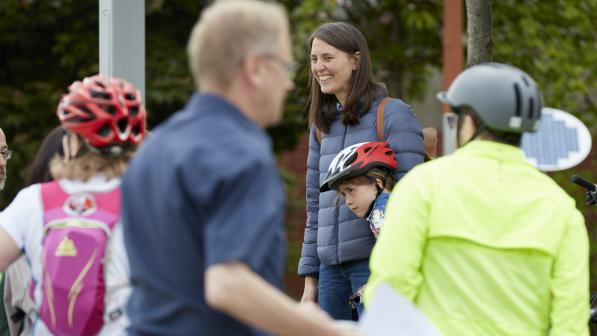Opinion: Road Safety Week reveals how far behind Northern Ireland has fallen, but there's still time

Almost one year ago, Adam McAteer, a 45-year-old architect and father of three, lost his life while cycling in Carrickfergus after a collision with a car. He was one of 72 cyclists in the UK who were killed or seriously injured in 2023 and stands to highlight the safety issues we still need to address on our roads.
Road Safety Week (17–23 Nov) reminds us that Northern Ireland is facing its highest road fatality rate in eight years, but the question is: what will it take for change to happen? The Department for Infrastructure’s (DfI) response so far has been focused on urging personal responsibility – a message that, while important, falls short of the action needed to make our roads safer.
In an impressive show of cross-party collaboration, DfI released a video last week in which Ministers came together to urge all road users to share the roads responsibly. While that’s an important message, it’s not enough. We can’t just rely on people to choose to behave safely and responsibly. We also need to see government Ministers legislate and regulate and not rely simply on public messaging campaigns.
Nearly three years ago, Great Britain’s Highway Code was changed to improve road safety for the most vulnerable road users, including people who walk, cycle and ride horses. However, it’s deeply disappointing that Northern Ireland Ministers have gone as far as refusing to even consult on instituting updates that have been made to the GB Highway Code - updates that have been rolled out to make roads safer. The failure to include these changes has meant that nearly 100,000 drivers have passed their test based on rules which could and should have been updated.
In 2019, a driver in Downpatrick drove into two cyclists, killing one of them and seriously injuring the other, then claimed it was the cyclists’ fault for riding side by side. GB’s Highway Code now instructs drivers that riding two abreast is often safer for cyclists, and that they should give a minimum of 1.5 metres when overtaking. There is no reason why this wouldn’t make sense in Northern Ireland.
Another change that would have a huge positive impact on road safety in Northern Ireland is the introduction of 20mph speed limits in residential and urban areas. Data from Wales, which recently rolled out 20mph in residential streets, shows that lower speeds have led to about 23% fewer deaths and serious injuries on Welsh roads – an unparalleled road safety initiative. That’s because lower speeds mean fewer collisions and when crashes do happen, they are less likely to be deadly. Every time I catch sight of someone speeding in my neighbourhood, I can't help but wonder: is saving two minutes on your drive to the shop really worth an increased chance of hurting or even killing someone?
The DfI has taken a positive step by introducing the Active Travel Delivery Plan, which if implemented will make roads safer for people who cycle through new infrastructure. However, new laws and lower speed limits are also key. To make cycling a natural choice for short journeys – and reap all the resulting health, environmental and economic benefits – the government must make it safe.
When Welsh Ministers like Lee Waters reflect on their time in power, they will be able to say for certain that they saved lives; all because they looked at the evidence, made bold decisions and followed through with policies like the 20mph rollout. With fewer than three years left to make progress on road safety in Northern Ireland, we need those same bold decisions from our own government to save lives. Without that momentum, the legacy of the government’s contribution to road safety legislation will lie in its decision to allow taxis to use bus lanes in Belfast.
Notes to editors
- Cycling UK, the UK’s cycling charity, aims to create happier, healthier and greener lives through cycling
- For more than 140 years, we’ve been making our streets safer, opening up new traffic free routes and inspiring more people to cycle more often. For more information visit: www.cyclinguk.org
Press contact information
For more information, please contact the national Cycling UK press office www.cyclinguk.org/contact/press-and-media.
If you would like to speak to a member of the press office during working hours (0900 - 1700) please call Joshua Gill on 07879 481 284 or email [email protected]. Out of hours, call 0148 3238 315.
